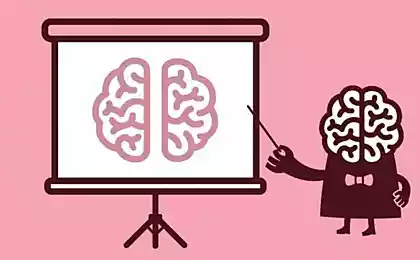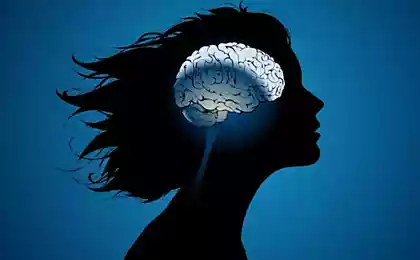927
What destroys our brain
Lack of sleep
This phenomenon is familiar to everyone becoming a global problem. According to WHO, over the past 100 years, people began to sleep on average 20% less. Severe lack of sleep is fraught with the fact that the actual state of wakefulness different parts of the brain are moving into a phase of slow wave sleep. At that time people "stuck" at one point, it becomes dispersed, deteriorating fine motor skills. Regular sleep deprivation leads to brain cell death.

The lack of breakfast
Skipping the morning meal a negative impact on performance and the tone of a man during the day. It seems obvious, but the point here is not so much the consumption of energy needed by the body, but in the fact that the lack of breakfast lowers blood sugar. This in turn reduces and impedes flow of nutrients into the brain.

Sugar
The previous paragraph explains why the productive work of the brain is recommended to eat sweet, especially dark chocolate. However, excessive amounts of sugar causes problems with the digestion of proteins and nutrients. The result is the same as the low level of sugar in the blood: nutrients to the brain is simply not received.

Stress
Severe emotional stress leads to the rupture of relations between neurons and hinders understanding of the cause-and-effect relationships and the sequence of events. Linked to this is a strong nervous excitement and the feeling that everything goes wrong. Accumulated stress impairs memory and reduces the intellectual potential.

Anti-depressants and sleeping pills
The problem craze potent drugs are most acute in the US, where such drugs are written out very easily. The use of sleeping pills and popular antidepressants like Xanax may impair memory until amnesia, dementia and obsessive cause suicidal thoughts.

Smoking
Speaking about the negative effects of smoking on the body, the first comes to mind images of black lungs and damaged teeth. This says quite a bit about how cigarettes affect the brain nicotine constricts blood vessels it. However, Cognac extends back. In addition to problems associated with the lack of nutrients in the brain, this greatly increases the risk of Alzheimer's disease.

Sun
Lack of sufficient sunlight directly affects cognitive abilities. Firstly, an ultraviolet obtained with sunlight, regulates blood flow, i.e. the flow of oxygen and nutrients. Secondly, sunlight helps produce serotonin - a hormone that affects mood.

Water
Lack of water causes a decrease in brain volume, which significantly reduces its efficiency and leads to almost zero ability to memorize information. It is recommended to use an average of 2 liters of water per day.

Excess information
Year after year, the amount of information to digest human avalanche increases. This would seem to exercise the brain and maintain its tone. In fact, it is an excess to which the brain responds uniquely: resistance. It is expressed by the fact that at some point the information ceases to be absorbed up to memory lapses.

Multitasking
Another anomaly in the world of information: people simultaneously receives multiple streams of information. As a result, none of them is not digested properly, and the mind gets used to a similar operation. Information is perceived superficially, and focus and doing something without a frequent change of activity is becoming increasingly difficult.

©
This phenomenon is familiar to everyone becoming a global problem. According to WHO, over the past 100 years, people began to sleep on average 20% less. Severe lack of sleep is fraught with the fact that the actual state of wakefulness different parts of the brain are moving into a phase of slow wave sleep. At that time people "stuck" at one point, it becomes dispersed, deteriorating fine motor skills. Regular sleep deprivation leads to brain cell death.

The lack of breakfast
Skipping the morning meal a negative impact on performance and the tone of a man during the day. It seems obvious, but the point here is not so much the consumption of energy needed by the body, but in the fact that the lack of breakfast lowers blood sugar. This in turn reduces and impedes flow of nutrients into the brain.

Sugar
The previous paragraph explains why the productive work of the brain is recommended to eat sweet, especially dark chocolate. However, excessive amounts of sugar causes problems with the digestion of proteins and nutrients. The result is the same as the low level of sugar in the blood: nutrients to the brain is simply not received.

Stress
Severe emotional stress leads to the rupture of relations between neurons and hinders understanding of the cause-and-effect relationships and the sequence of events. Linked to this is a strong nervous excitement and the feeling that everything goes wrong. Accumulated stress impairs memory and reduces the intellectual potential.

Anti-depressants and sleeping pills
The problem craze potent drugs are most acute in the US, where such drugs are written out very easily. The use of sleeping pills and popular antidepressants like Xanax may impair memory until amnesia, dementia and obsessive cause suicidal thoughts.

Smoking
Speaking about the negative effects of smoking on the body, the first comes to mind images of black lungs and damaged teeth. This says quite a bit about how cigarettes affect the brain nicotine constricts blood vessels it. However, Cognac extends back. In addition to problems associated with the lack of nutrients in the brain, this greatly increases the risk of Alzheimer's disease.

Sun
Lack of sufficient sunlight directly affects cognitive abilities. Firstly, an ultraviolet obtained with sunlight, regulates blood flow, i.e. the flow of oxygen and nutrients. Secondly, sunlight helps produce serotonin - a hormone that affects mood.

Water
Lack of water causes a decrease in brain volume, which significantly reduces its efficiency and leads to almost zero ability to memorize information. It is recommended to use an average of 2 liters of water per day.

Excess information
Year after year, the amount of information to digest human avalanche increases. This would seem to exercise the brain and maintain its tone. In fact, it is an excess to which the brain responds uniquely: resistance. It is expressed by the fact that at some point the information ceases to be absorbed up to memory lapses.

Multitasking
Another anomaly in the world of information: people simultaneously receives multiple streams of information. As a result, none of them is not digested properly, and the mind gets used to a similar operation. Information is perceived superficially, and focus and doing something without a frequent change of activity is becoming increasingly difficult.

©
























